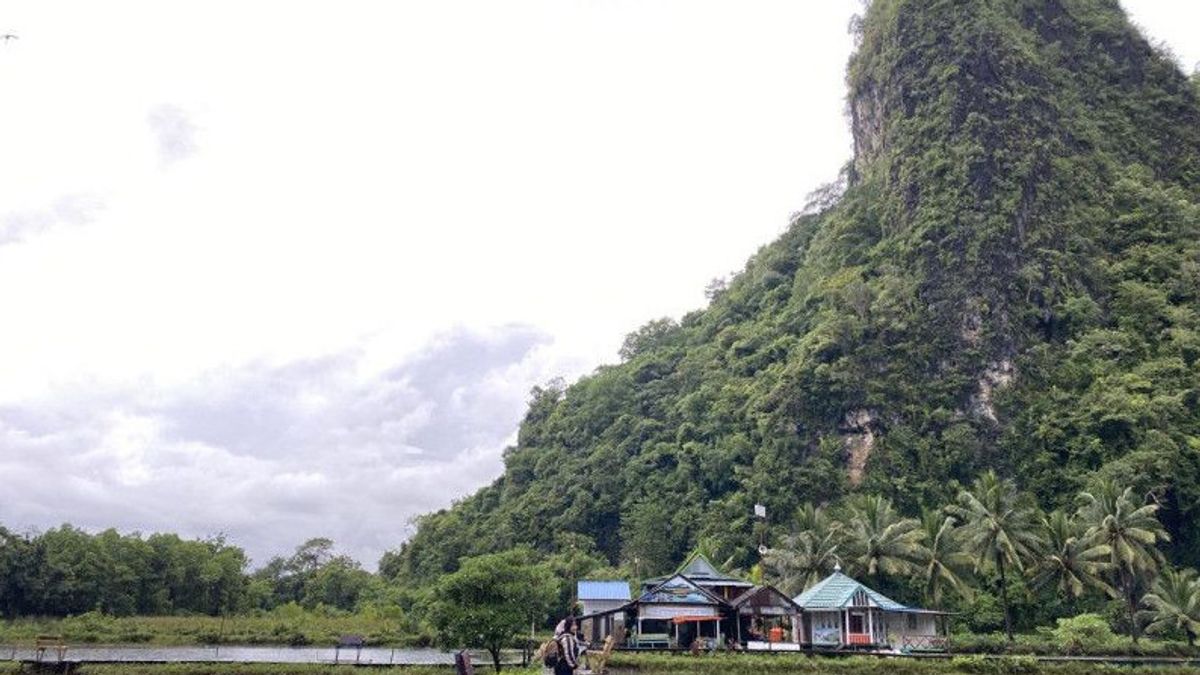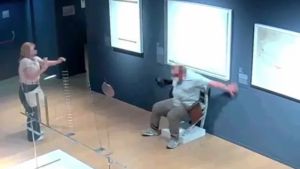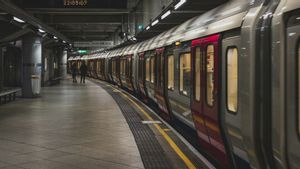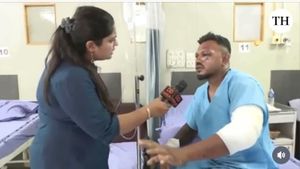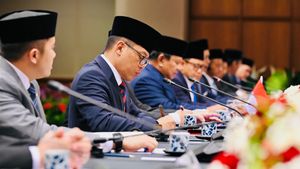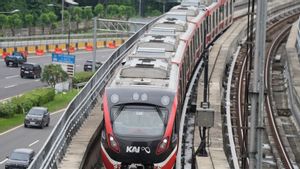MAROS - Organic farming is one of the initiatives of the people of Salenrang Village, Maros, South Sulawesi in realizing ecotourism.
More than reaping a healthy life, this step is predicted to be the main attraction in supporting Rammang-Rammang tourism.
Kampung Berua as a tourist center for Karst Rammang-Rammang which offers views of rice fields surrounded by karst cliffs will be even more fitting when the expanse of rice fields is managed in natural ways from the hands of local and cultured farmers.
Farming is the main source of livelihood for the people of Salenrang Village, so organic farming is chosen to be part of the community's initiation, especially for a number of millennial farmers.
One of them is Darwis, who has tried the organic farming system on a plot of rice field owned by his parents in Berua Village.
It is not easy to do this, besides having to learn more about applying natural farming, Darwis is also faced with family concerns about the success of his business in trying organic farming. Not to mention the local community.
The 37-year-old man is still persistent in doing organic farming which is considered to have many benefits and produces superior agricultural products to be able to support the economy and tourism of Rammang-rammang.
"I think if it can be developed, it can be an attraction in itself, although it's a bit difficult to switch because around the rice fields we use chemicals, it's still a conventional farming model," said the head of the RT Kampung Berua.
Setting a good example for the community, for Dervish, is an absolute must. Because most people will show changes if they get maximum results.
Dervish believes that everyone tends to want to see the results first rather than the principle of the benefits that can be obtained from each different initial step.
As a result, the organic farming experiment which started in 2020 has the same results as conventional agriculture in quantity, but the quality is certainly better and guaranteed to be healthier.
"The average citizen wants to be serious when they see the results, so there must be an example. It will not be possible if no one starts, while the results are more or less the same. It just takes a process to purify the land," said the former head of the Rammang-Rammang Tourism Awareness Group.
This organic agricultural product is planned for travelers who come to Salenrang Village as a typical souvenir of the Rammang-Rammang Karst Tourism.

The form of village independence
Together with the community's initiation, organic farming has also become the main focus of the development of Salenrang Village in realizing village independence. Moreover, this village has been named a Food Security Village in 2017 and a Tourism Village in 2021.
Secretary of the Village of Salenrang Sumantri said that the vision as a Food Barn Village and a Tourism Village could really go hand in hand to support the development of the ecotourism community.
The development of organic agriculture is a process that the people of Salenrang must try and carry out in order to produce superior and quality agricultural products while maintaining the title of Food Security Village.
"If this is successful, even though the production is reduced, maybe it can be sold a little. But it could be double the price, because this rice is organic, healthy and not contaminated with chemicals," said Sumantri, quoted by Antara, Friday, March 25.
Since 2020, trials have been carried out and are still in the process of learning the development of organic agriculture. The community of Salenrang Village is considered to still have to obtain nutritional knowledge about organic farming cultivation.
According to Sumantri, the conversion of agricultural land has been recognized as an obstacle to realizing food self-sufficiency in recent years. Agricultural land is transformed into settlements, warehouses, factories, and public facilities.
The railroad tracks add to the crisis of agricultural land in Salenrang Village. The railroads take up about 7 hectares of farm space for a single track and become more when additional lines are built.
"If there is another axis to Bosowa, it has doubled. So how to deal with it, they must be encouraged to switch to organic farming. The quantity is small but promises quality and a relatively higher price," he said.
However, Berua Village and Salenrang Village in general have the potential to develop organic agriculture because they are surrounded by two rivers, namely the Pute River and the Barua River, so that contamination from outside can be minimized.

Organic guano fertilizer
The interest of millennial farmers to try organic farming in the midst of tourism areas is not without reason, Salenrang Village has natural resources that are considered potential to support the agricultural system that is carried out.
Bat dung or guano as raw material for fertilizer is available in the karst mountains of the Rammang-Rammang tourist area, so that the people of Salenrang Village are currently developing it into organic fertilizer or guano fertilizer.
This animal is often found by visitors at sunset. The types of bats that exist in the Rammang-rammang area are fish-eating bats, which at nightfall will fly to the sea to look for fish.
The processing of organic guano fertilizer has also been present in Salenrang Village for the last two years, becoming one of the Village-Owned Enterprises (BUMDES) and managed by local residents. One of them is a millennial farmer named Naharuddin.
In addition to the potential availability of raw materials, concerns about the scarcity of fertilizers in the market also underlie the presence of the Guano Organic Fertilizer House "Tai Sarang" belonging to the Salenrang Bumdes.
"We really want to switch to organic fertilizer, at least it's healthier," said Naharuddin.
The process of processing fertilizers is not difficult, but obtaining raw materials for guano must be carried out with caution. So when it comes time to take guano, it will save more.
Through the Bumdes Appakabaji Pupuk Guano, the Village Government also empowers local communities from Berua Village to take guano which is located on top of a mountain and in a cave.
This process, according to Naharuddin, is not easy. Have to wait about six to seven months to be able to go up to the mountain to collect guano, the goal is not to damage the bat habitat, let alone make them feel threatened.
But on the other hand, this guano should not be allowed too because the ammonia guano will threaten the sustainability of the bat habitat.
"If we take it, it actually helps the bats from extinction because if we don't take it (guano) then the ammonia itself will make them go away. The more they accumulate and eventually leave," said Naharuddin.
Since its arrival in 2020, Guano Organic Fertilizer House has produced 100 bags of fertilizer. If sold, this guano fertilizer is priced at Rp. 50 thousand for 10 kg. But so far, the marketing is focused only on the local community. Even distributed free of charge to local residents.
Naharuddin and the manager of the Guano Fertilizer Production House have more than just an economic goal, the main goal is to support the transition of the minimum community in the Rammang-Rammang hamlet to adopt organic agriculture and no longer use chemical fertilizers.
From there, it is believed that it will give birth to a quality and superior agricultural product because it is free from chemicals during its management. This product is certainly a complement to the Rammang-Rammang ecotourism.
The English, Chinese, Japanese, Arabic, and French versions are automatically generated by the AI. So there may still be inaccuracies in translating, please always see Indonesian as our main language. (system supported by DigitalSiber.id)
